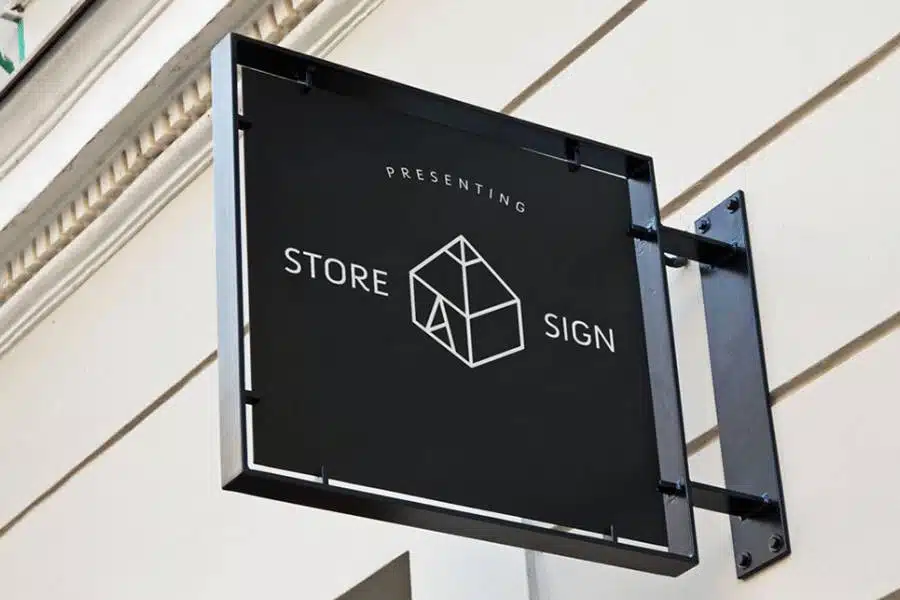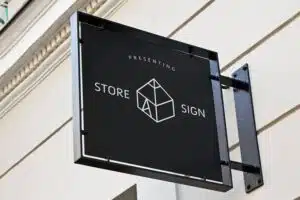The Power Of Vibrant Colors h3 >
To captivate audiences effectively ,we cannot underestimate how impactful vibrant hues prove when designing eye-catching exterior displays .Let’s be real: if they blend into surroundings like chameleons at paint parties ,we might as well wave goodbye potential clientele !By incorporating< strong >lively graphics and bold fonts < /a>,our creations will scream “Look here!” without actually yelling (that would be awkward).
Picture this: It’s sunny outside ; shoppers stroll leisurely around town looking forward either retail therapy or simply good laughs .Our visuals ought pop out akin confetti during surprise parties !
Whether opting fiery reds radiating excitement or cheerful yellows inviting smiles —decisions made must resonate deeply .
Colors possess personalities too : blues soothe while oranges energize .Combining these lively shades transforms displays into visual fiestas capturing interest faster than squirrels chasing nuts !
Selecting Clear Typography Choices < / h3 >
Let us face facts : if your display resembles fancy font experiments gone awry —you may inadvertently lead patrons towards confusion town instead clarity !
We need fonts easily readable from distances since not everyone possesses superhero vision capabilities !
Additionally ,let’s emphasize importance maintaining consistent branding throughout typography choices reflecting overall personality whether aiming classy quirky wild vibes .If messages convey seriousness yet logos wink playfully —mixed signals abound leading confusion among viewers !
Pursuing Weather-Resistant Materials < / h3 >
Selecting appropriatew eather-resistant m aterials em > s trong >for exterior displays remains paramount ensuring resilience against environmental factors whilst preserving attractiveness over time .After all,nobody desires visuals resembling aftermaths hurricanes coupled angry squirrel stampedes !
So let us delve deeper exploring fantastic options capable enduring rain shine everything else life throws forth :
First off consider aluminum ;its lightweight rust-proof nature allows handling tough conditions effortlessly without breaking sweat .
Next comes high-density polyethylene (HDPE)—the superhero among outdoorsy substances renowned durability UV protection properties .
Lastly don’t overlook acrylic ;it boasts clarity vibrancy mimicking glass minus shattering worries altogether !
Once favorite material selected tackling installation process becomes priority ensuring secure placements preventing unintentional flying objects during windy days ahead.Trust me,nothing screams professionalism quite like misplaced advertising taking vacation down street unexpectedly!
picking right weatherproof components proves key achieving functional attractive results simultaneously.Let’s aim make ours envy-worthy across entire region surrounding beautifulL ake F orest! em >
Navigating Local Regulations And Permits < / h2 >
Before embarking upon journey crafting stunning exteriors within L ake F orest understanding local regulations permits governing installations becomes imperative.Trust me,nothing dampens grand unveiling quicker than friendly visits city officials awkwardly interrupting festivities right ?
We’ve heard tales regarding permit requirements feeling akin deciphering hieroglyphics—but rest assured they’re established purposefully maintain aesthetic integrity prevent sudden disappearances overnight concerning beloved creations too !
Prior diving headfirst neon lights oversized banners checking restrictions remains prudent move.Maybe inflatable dancing banana seems brilliant idea—but if unapproved list exists disappointment awaits leaving deflated fruit behind sadly waving goodbye dreams glory days ahead…
Navigating regulations may seem tedious chore initially however better sorting beforehand avoiding consequences later down road.So roll sleeves research diligently ensure captivating designs comply fully legal standards because shining bright stores deserve no bureaucratic hiccups whatsoever!
Tips For Maintenance Ensuring Longevity < / h2 >
After successfully navigating local regulations obtaining necessary permits establishing beautiful exteriors next step involves guaranteeing optimal condition lasting years ahead.
Signs resemble friends needing occasional TLC minus late-night phone calls involved!
Let’s kickstart maintenance routine cleaning techniques.A gentle soap-water mixture works wonders treating surfaces spa day style avoiding harsh chemicals since every creation deserves utmost care possible !
For protective measures consider applying sealants shielding against fierce winters blazing summers alike acting sunscreen protecting delicate surfaces .
Regarding repairs vigilance pays off immensely spotting scratches faded letters promptly addressing issues before spiraling emergencies arise unexpectedly .
Finally preventative measures matter greatly conducting regular inspections catching problems early preventing disasters unfolding later down line.Keeping visuals sharp equates well-dressed individuals turning heads everywhere they go!
A Glimpse At Successful Signs In Action < / h2 >
Exploring examples showcasing successful implementations reveals creativity clarity pivotal roles attracting attention conveying messages efficiently.Imagine strolling streets encountering sign proclaiming “Free Wi-Fi No Password Required!” Who wouldn’t feel compelled check store out? That embodies creative branding making chuckle luring patrons simultaneously !
Another standout example includes bakery boasting “Our croissants flakier exes!” Now that’s targeted messaging resonating anyone experiencing breakups humorous relatable impossible ignore.
And let’s highlight classic bar declaring“We serve beer cold enough give frostbite!” Talk about clever twist delivering quick messages leaving lasting impressions behind!
In conclusion successful exterior displays merge innovative branding targeted messaging attracting clientele whilst providing giggles along way.As brainstorm own concepts remember humor clarity transform casual passerby loyal customer base forevermore!
Your Questions Answered: FAQ Section < / h1 >
Averaging Costs Associated With Durable Exterior Displays?




















